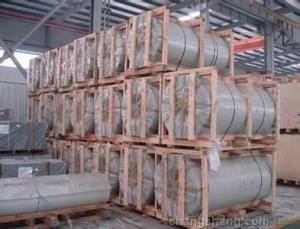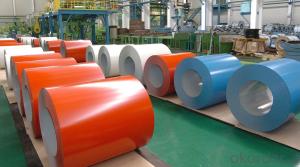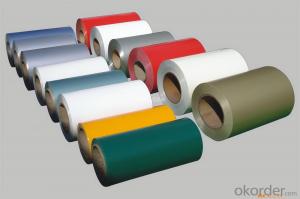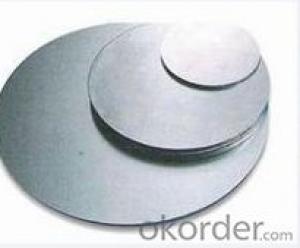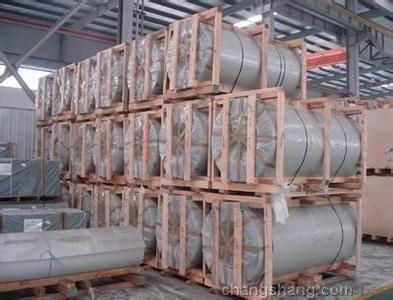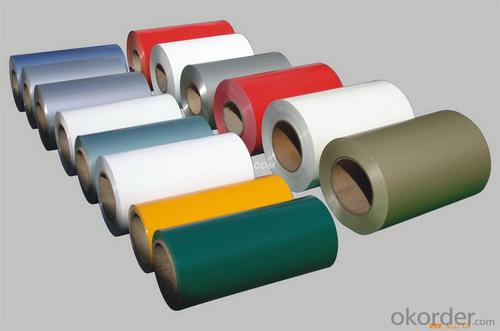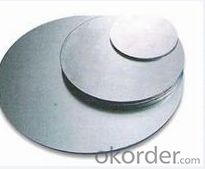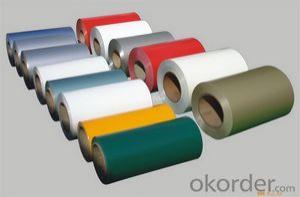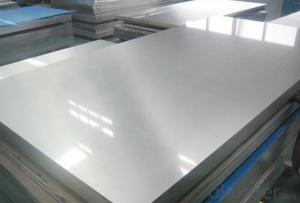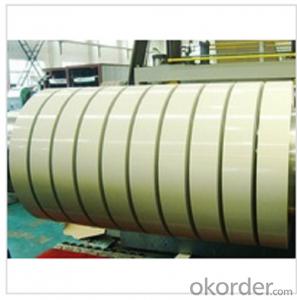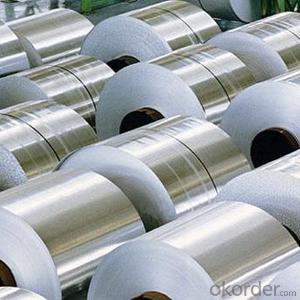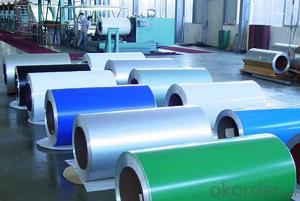407c Aluminum Coil - AA 3003 Anodizing Aluminum Sheet
- Loading Port:
- China Main Port
- Payment Terms:
- TT OR LC
- Min Order Qty:
- -
- Supply Capability:
- -
OKorder Service Pledge
Quality Product, Order Online Tracking, Timely Delivery
OKorder Financial Service
Credit Rating, Credit Services, Credit Purchasing
You Might Also Like
supply Mill-finished / coated aluminum sheet/ coil:
Alloy: AA1050,1060,1100,1200,2024,3003,3304,3005,3015,5052,5086,5754,5083,6061,7050,7475,8011, etc
Temper: O, H14/16/18/22/24/32/ H112/H321/T6,T851,T7451,T7351, etc
Thickness: 0.02mm—20mm
Width: 100mm—2000mm (Can be slitted)
Notice: PE coating / PVDF coating / Embossment can be done if required.
- Q: What is the typical width tolerance for aluminum coils?
- Depending on the specific industry and application, the width tolerance for aluminum coils can vary. Typically, the width tolerance for aluminum coils is around ±0.005 to ±0.010 inches. This means that the actual width of the aluminum coil can vary within this range from the specified target width. It is important to understand that these tolerances can be stricter or more lenient depending on the specific requirements of the customer or application. Furthermore, aluminum coil manufacturers often provide different width tolerances for different grades or thicknesses of aluminum coils. Therefore, it is essential to refer to the manufacturer's specifications or guidelines for accurate information on the width tolerance for a particular aluminum coil.
- Q: Are there any specific guidelines for the handling of aluminum coils?
- There exist specific guidelines for the handling of aluminum coils, with several key points to consider: 1. Appropriate lifting techniques: To handle aluminum coils, it is crucial to utilize suitable lifting equipment such as cranes or forklifts. These tools must possess the capacity to handle the weight of the coils in order to prevent accidents or damage. 2. Usage of protective gear: Workers must wear personal protective equipment (PPE) like gloves and safety goggles to safeguard themselves against sharp edges or potential injuries during handling. 3. Secure packaging: Aluminum coils must be stored or transported in secure packaging to prevent damage. This can be accomplished by employing suitable pallets, straps, or protective covers to ensure that the coils are held in place and protected against external factors like moisture or impact. 4. Proper stacking: When storing or transporting aluminum coils, it is vital to stack them in a manner that guarantees stability and prevents them from falling or causing accidents. The coils should be stacked evenly and securely, with adequate support and spacing between each stack to avoid deformation or damage. 5. Avoidance of contact with corrosive materials: Aluminum coils should not come into contact with corrosive materials such as acids or alkalis, as they can cause damage or corrosion to the metal. It is important to store aluminum coils in a clean and dry environment to preserve their quality. 6. Gentle handling: Aluminum coils are prone to scratches, dents, and other forms of damage, thus they should be handled with care to avoid these issues. Dragging or sliding the coils during handling should be avoided, and they should be placed gently to prevent any potential damage. 7. Training and supervision: Workers involved in the handling of aluminum coils should receive adequate training and supervision to ensure adherence to the specific guidelines and safety procedures. Regular training sessions can help refresh their knowledge and reinforce safe handling practices. By adhering to these guidelines, the proper handling of aluminum coils can be ensured, thereby reducing the risk of accidents, damage, or loss of quality.
- Q: Are aluminum coils suitable for food processing applications?
- Yes, aluminum coils are suitable for food processing applications. Aluminum is a non-toxic and corrosion-resistant material, making it safe for direct contact with food. It also has excellent heat conductivity, allowing for efficient heating and cooling processes in food processing. Additionally, aluminum coils are easy to clean and maintain, making them a popular choice in the food industry.
- Q: This question asks for methods to assess the quality of aluminum coils.
- <p>To determine the quality of aluminum coils, consider several factors: purity and alloy composition, which affects strength and corrosion resistance; surface condition, checking for scratches, dents, or impurities that can affect performance; mechanical properties like tensile strength and elongation; and dimensional accuracy, including thickness, width, and straightness. Conduct tests such as hardness tests, tensile tests, and corrosion resistance tests. Visual inspection and using measuring tools for dimensional checks are also crucial. Compliance with industry standards and certifications from recognized bodies can also indicate quality.</p>
- Q: How does the alloy composition affect the properties of aluminum coils?
- The properties of aluminum coils are significantly influenced by their alloy composition. To enhance specific characteristics, aluminum is often combined with elements like copper, manganese, magnesium, and zinc. The strength of aluminum coils is a key property that is impacted by the alloy composition. Copper and zinc alloys, such as the popular 6061 or 7075 aluminum alloys, are renowned for their high strength, making them suitable for structural purposes. Conversely, manganese and magnesium alloys, like the 3003 or 5052 aluminum alloys, offer improved formability and are commonly used in the construction of automotive components or packaging materials. Corrosion resistance is also affected by the alloy composition of aluminum coils. For example, the addition of magnesium in alloys like 5052 or 5083 enhances their resistance to corrosion in marine environments, making them ideal for boat building or other marine applications. On the other hand, copper alloys possess excellent resistance to atmospheric corrosion and are frequently utilized in outdoor structures or architectural applications. The thermal conductivity of aluminum coils is another crucial property impacted by the alloy composition. Copper alloys exhibit high thermal conductivity, making them efficient for heat transfer applications such as heat exchangers or radiators. Aluminum-magnesium alloys, like 3003 or 3004, have lower thermal conductivity, making them suitable for applications where heat dissipation is desired, such as heat sinks in electronic devices. Additionally, the alloy composition can influence the electrical conductivity of aluminum coils. Copper alloys, with their high electrical conductivity, are commonly used in electrical wiring and conductors. However, aluminum-magnesium alloys, despite having lower electrical conductivity than copper, are still widely employed in electrical transmission lines and overhead power cables due to their lightweight nature. In conclusion, the alloy composition of aluminum coils plays a crucial role in determining their properties. It affects their strength, corrosion resistance, thermal conductivity, and electrical conductivity, allowing them to be customized for specific applications.
- Q: This question asks for methods to take care of and preserve aluminum coils, ensuring their longevity and functionality.
- <p>To maintain aluminum coils, follow these steps: Keep them clean by wiping off any dust or debris. Store them in a dry environment to prevent corrosion. Avoid stacking heavy objects on top to prevent deformation. Regularly inspect for any signs of damage or wear. Use appropriate handling equipment to avoid scratches or dents. Apply a protective coating if exposed to harsh conditions. Ensure proper ventilation during storage to prevent condensation. By following these practices, you can prolong the life and maintain the quality of aluminum coils.</p>
- Q: What are the potential applications of coil-stucco aluminum coils?
- Coil-stucco aluminum coils possess distinctive properties and characteristics, resulting in a broad range of potential applications. Some of these applications include: 1. Building and construction: Within the construction industry, coil-stucco aluminum coils find widespread use for various purposes. They offer durability, versatility, and aesthetic appeal when employed in roofing, cladding, and siding applications. The stucco finish on the coils adds texture and enhances the overall appearance of buildings. 2. Transportation industry: The transportation industry also utilizes coil-stucco aluminum coils for the manufacturing of trailers, truck bodies, and other vehicles. Aluminum, being lightweight yet strong, proves to be an ideal material for reducing vehicle weight and increasing fuel efficiency. The stucco finish on the coils adds strength and resistance against scratches and abrasions. 3. Appliances and electronics: Coil-stucco aluminum coils are suitable for the manufacturing of appliances and electronics due to their corrosion resistance and thermal conductivity. Commonly found in refrigerators, air conditioning units, and other household appliances, aluminum coils are highly valued. The stucco finish provides an extra layer of protection against wear and tear. 4. Signage and advertising: The signage and advertising industry extensively employs coil-stucco aluminum coils for creating outdoor signs, billboards, and displays. The stucco finish reduces glare and reflections, enhancing the visibility of the signs. Moreover, aluminum's weather-resistant nature makes it an appropriate choice for outdoor applications. 5. Packaging industry: The packaging industry also finds applications for coil-stucco aluminum coils. Aluminum, being non-toxic and non-reactive, proves to be a suitable material for packaging food and beverages. The stucco finish adds an appealing texture to the packaging material, making it visually attractive. 6. Industrial applications: Coil-stucco aluminum coils are used in various industrial applications, including the manufacturing of equipment, storage tanks, and processing systems. Aluminum coils are preferred in industries where excellent corrosion resistance, high thermal conductivity, and strength are crucial. In conclusion, coil-stucco aluminum coils possess diverse and extensive potential applications. The unique properties of aluminum, combined with the stucco finish, make these coils suitable for a wide range of industries, including construction, transportation, appliances, signage, packaging, and industrial applications.
- Q: who discovered aluminum and in what year did they discover it?
- Aluminum was named for one its most important compounds, alum. Alum is a compound of potassium, aluminum, sulfur, and oxygen. The chemical name is potassium aluminum sulfate, KAl(SO4)2. No one is sure when alum was first used by humans. The ancient Greeks and Romans were familiar with the compound alum. It was mined in early Greece where it was sold to the Turks. The Turks used the compound to make a beautiful dye known as Turkey red. Records indicate that the Romans were using alum as early as the first century B.C. It was first ISOLATED in 1827 by German chemist Friedrich W?hler (1800-82). W?hler used a method perfected by English chemist Sir Humphrey Davy (1778-1829),
- Q: This question asks for a comparison of the costs involved in purchasing new aluminum coils versus recycling old ones.
- <p>The cost of buying new aluminum coil versus recycling old ones can vary significantly based on several factors including market prices, quality of the recycled material, and the cost of recycling processes. Generally, recycling aluminum is more cost-effective as it requires less energy and resources compared to producing new aluminum from raw materials. The cost of recycled aluminum can be as low as half of that for new aluminum. However, the exact cost will depend on current market conditions and the specific requirements of the aluminum coils in question. It's advisable to get quotes from suppliers and recycling companies to determine the most economical option for your specific needs.</p>
- Q: Will the surface of aluminum contact water if the aluminum coil falls into water?
- That depends on how tight the aluminum coil is. If it is very tight, aluminum will stick together, thus no water can get in.
Send your message to us
407c Aluminum Coil - AA 3003 Anodizing Aluminum Sheet
- Loading Port:
- China Main Port
- Payment Terms:
- TT OR LC
- Min Order Qty:
- -
- Supply Capability:
- -
OKorder Service Pledge
Quality Product, Order Online Tracking, Timely Delivery
OKorder Financial Service
Credit Rating, Credit Services, Credit Purchasing
Similar products
Hot products
Hot Searches
Related keywords
